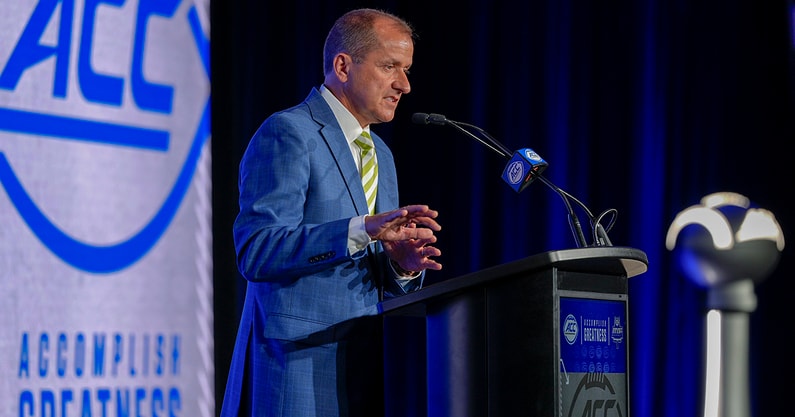Jim Phillips: I haven't had one student-athlete say they want to be an employee

With revenue-sharing’s arrival in college sports, the idea of athletes as employees remains a discussion point. That was again the case with the introduction of the SCORE Act in the House of Representatives, which would make it clear athletes are not employees.
Speaking at ACC Kickoff on Tuesday, commissioner Jim Phillips said that’s one of the central parts of the bipartisan bill. Based on his conversations with those around his conference, he senses athletes don’t want employment status.
Phillips reiterated the call for federal college sports legislation, but said the academics portion is still important in the current landscape. That’s why he’s against employment status, particularly in the revenue-sharing era following House v. NCAA settlement approval.
“One of the major facets that we’re looking at in the SCORE Act is this reaffirmation that these are student-athletes, that these aren’t employees,” Phillips said. “Along with the national standard, some legal protection from the onslaught of lawsuits. I had a chance yesterday, as I described, to talk to our student-athletes. They understand it. They understand. I haven’t had one student-athlete come up to me to say that they want to be an employee. I think they appreciate being in college, going to school, working critically hard to earn a valuable degree, and playing a sport at the highest level.
“It’s wonderful that we can now pay our student-athletes. I think it’s fantastic. How that distribution comes out and who gets those dollars, etc., those are still to be determined by schools, but that’s the next step in the modernization of college sports is to get that reaffirmation that these indeed are student-athletes.”
Top 10
- 1New
SEC Football
Predicting 1st loss for each team
- 2
ESPN acquires RedZone
$1 Billion agreement
- 3Hot
College Football Playoff
Ranking Top 32 teams for 2025
- 4Trending
Tim Brando
Ranks Top 15 CFB teams for 2025
- 5
Most improved teams
Top 12 for 2025
Get the Daily On3 Newsletter in your inbox every morning
By clicking "Subscribe to Newsletter", I agree to On3's Privacy Notice, Terms, and use of my personal information described therein.
The SCORE Act, introduced July 10, would grant liability protection and preempt state NIL laws. It would also include an anti-employment clause and usher in regulation for agents. NIL deals would also need to hold a “valid business purpose.” It was forwarded to committee July 15 and is getting closer to the House floor.
Additionally, the SCORE Act would codify the House settlement, which ushered in the rev-share era. As things settle – though some questions swirl, particularly with regard to the NIL Go clearinghouse – Jim Phillips stressed patience as the implementation process continues.
“As we move forward and continue to meet this true reset moment, we must remember that everything will not be perfect immediately,” Phillips said. “We know we must get this right, which we take very seriously. We’re being thoughtful about every detail and are committed to progress through learning, adapting, and strengthening the model to support and protect college sports for generations to come. And the obligation to get this right is one the entire industry shares.
“From me and my fellow commissioners to university presidents, athletic directors, and coaches, we have to commit to structure, exercise restraint, and be intentional about resetting the culture of college athletics. Without question, there’s still significant work to be done, but we must acknowledge that, collectively, we are truly in a better place and we have a responsibility to make it work in the future.”